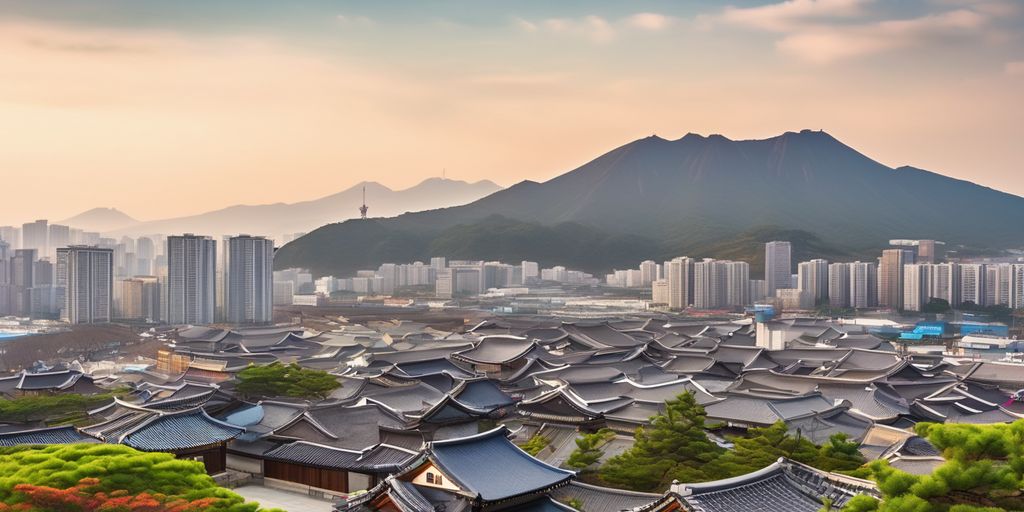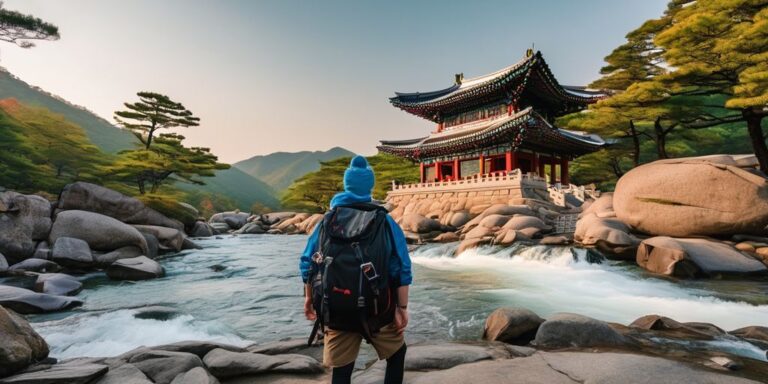
Embarking on a journey from the bustling streets of Seoul to the tranquil shores of Jeju Island offers a rich tapestry of experiences that showcase the depth and diversity of South Korea. This article guides you through the essentials of preparing for your trip, exploring major cities, and enjoying the unique cultural and natural attractions each destination has to offer.
Key Takeaways
- Understand and respect Korean etiquette to enhance your interactions.
- Pack wisely, considering both the cultural norms and the varied climates across regions.
- Utilize Seoul’s extensive public transport system to navigate the city efficiently.
- Explore the coastal and culinary delights of Busan to experience its local culture.
- Plan your Jeju visit with an emphasis on natural attractions and consider alternative transportation options if traveling without a car.
Starting Your Adventure: Preparing for Korea
Essential Pre-Departure Tips
Before embarking on your journey to Korea, it’s crucial to ensure all travel documents are in order. Check visa requirements and make sure your passport is valid for at least six months after your planned return date. Additionally, familiarize yourself with the local laws and customs to avoid any misunderstandings.
What to Pack
Packing for Korea can vary greatly depending on the season. Essentials include comfortable walking shoes, a universal power adapter, and appropriate clothing for the weather. Don’t forget to pack any necessary medications and a basic first aid kit.
Understanding Korean Etiquette
Korean culture places a high value on respect and manners. Always greet people with a slight bow and avoid placing your hands in your pockets while talking. Learning a few basic phrases in Korean can go a long way in showing respect and enhancing your experience.
Exploring Seoul: The Heart of Korea
Top Attractions in Seoul
Seoul, the vibrant capital of South Korea, offers an array of unforgettable attractions. Explore the historical Gyeongbokgung Palace, dress in traditional Hanbok, and enjoy the panoramic views from N Seoul Tower. The city’s blend of ancient traditions and modern innovations creates a unique cultural landscape.
- Gyeongbokgung Palace
- N Seoul Tower
- Bukchon Hanok Village
Cultural Insights and Experiences
Seoul is a city where history and modernity coexist. Engage in a traditional tea ceremony or visit the bustling streets of Myeongdong for a taste of local fashion and street food. The city’s rich cultural tapestry is woven from its diverse districts, each offering a distinct flavor of Korean life.
- Traditional tea ceremonies
- Myeongdong shopping district
Navigating the City: Transportation Tips
Getting around Seoul is convenient thanks to its comprehensive public transportation system. Utilize the extensive subway network to reach various districts efficiently. For a more scenic route, try the Han River ferry service. Remember, the T-Money card is your best companion for accessing multiple modes of transport with ease.
- Subway network
- Han River ferry service
- T-Money card
Beyond Seoul: Discovering the DMZ and Nami Island
A Day at the DMZ: Expectations and Realities
Visiting the DMZ (Demilitarized Zone) between North and South Korea is a profound experience that contrasts starkly with the bustling life of Seoul. Expect a day filled with historical insights and the eerie quiet of a land caught in time. Most tours, including the popular DMZ Tunnel Tour, start early and involve strict security checks.
The Serene Beauty of Nami Island
Nami Island is renowned for its tranquil beauty and scenic landscapes, making it a perfect getaway from the urban sprawl. The island can be reached via a short ferry ride, offering visitors a chance to immerse themselves in nature. Activities include walking along tree-lined paths, cycling, and picnicking by the riverside.
Travel Tips for Outskirts of Seoul
When planning excursions to the DMZ and Nami Island, consider these tips:
- Book guided tours in advance to ensure availability.
- Wear comfortable clothing and shoes suitable for walking.
- Check weather forecasts and prepare accordingly, as conditions can change rapidly in these areas.
Heading South: The Coastal Charm of Busan
Must-Visit Places in Busan
Busan, a city with a perfect seaside backdrop and blissful mountain views, offers a more laid-back experience compared to Seoul. Top attractions include Haeundae Beach, the vibrant Gamcheon Culture Village, and Gwangalli Beach. This city is not just about its beaches; it’s a place to relax and de-stress while enjoying close proximity to historical Gyeongju.
Exploring Busan’s Culinary Scene
Busan’s culinary offerings are as diverse as its landscape. From street food stalls to high-end seafood restaurants, the city caters to all palates. Key dishes to try include the local seafood, particularly at the Jagalchi Fish Market, known for its fresh catches. Dining here provides not just a meal, but a vibrant atmosphere of local life and culture.
Cultural Festivals and Events
Busan is vibrant with cultural festivals and events throughout the year. The Busan International Film Festival is one of the most notable, drawing audiences and filmmakers from around the world. Other events include the Busan Fireworks Festival and the Busan Port Festival, which celebrate the city’s maritime heritage and modern culture.
The Historical City of Gyeongju
Exploring Ancient Ruins
Gyeongju, once the capital of the ancient Silla Kingdom, is a treasure trove of historical significance. Visitors can explore numerous ruins and relics that tell tales of a bygone era. Key sites include the Bulguksa Temple and the Cheomseongdae Observatory, which offer insights into the architectural and astronomical advancements of ancient Korea.
Cultural Heritage Sites
This city is not only about ancient ruins but also about vibrant cultural heritage that has been preserved over centuries. The Gyeongju National Museum and the Royal Tumuli Park showcase exquisite artifacts and royal burial mounds, providing a deeper understanding of the Silla dynasty.
Local Cuisine Highlights
Gyeongju is also famous for its unique local cuisine, which includes specialties like ‘Hwangnam bread’ and ‘Ssambap’. These dishes offer a taste of the region’s rich culinary history. Food enthusiasts can indulge in these flavors, which are a testament to the city’s cultural depth and diversity.
Journey to Jeju Island
Jeju Island, a gem off the southern coast of Korea, offers a unique blend of scenic beauty and cultural experiences. Planning your trip well can ensure you capture all its enchanting elements.
Planning Your Trip to Jeju
Organize your travel from Seoul to Jeju to make the most of your time. Flights are frequent and short, typically around an hour. Consider the best times to visit, usually spring or fall, to enjoy mild weather and vibrant festivals.
Activities and Attractions
Jeju Island is not just about its pristine beaches and lush landscapes; it’s a place of deep cultural heritage and exciting adventures. Explore the Hallim Park, meet the Haenyeo women divers, or relax on the white sandy beaches. Each activity offers a glimpse into the island’s unique lifestyle and natural beauty.
Navigating the Island Without a Car
While Jeju is accessible, getting around without a car requires some planning. Utilize local buses, rent a bicycle, or join guided tours to explore the island efficiently. Here’s a quick guide to help you:
- Local Buses: Connects major attractions and cities.
- Bicycle Rental: Offers a scenic and leisurely way to see the island.
- Guided Tours: Ensure you don’t miss out on hidden gems.
Jeju’s public transport system is robust, making it possible to explore the island’s best sites without personal transport.
Concluding Your Korean Journey
Reflecting on the Experience
As your journey across Korea comes to an end, take a moment to reflect on the myriad of experiences you’ve encountered. From the bustling streets of Seoul to the tranquil shores of Jeju Island, each location offered its own unique charm and stories. Reflect on the personal growth and understanding you’ve gained about Korean culture and how these memories will resonate with you long after you’ve returned home.
Last-Minute Tips and Tricks
Before you pack your bags for the final time, here are a few last-minute tips to ensure a smooth departure:
- Double-check your travel documents and itineraries.
- Confirm transportation to the airport well in advance.
- Leave ample time for any last-minute shopping or sightseeing.
- Ensure you have all your souvenirs and personal belongings secured.
These steps will help you avoid any unnecessary stress and allow you to enjoy your remaining time in Korea.
Preparing for Departure
As you prepare to leave, remember the warmth and hospitality of the Korean people. The journey might be concluding, but the connections and friendships you’ve made are lasting. Here’s a quick checklist to aid your departure process:
- Check out of your accommodation.
- Settle any outstanding bills.
- Exchange contact information with new friends.
- Reflect on your journey and the moments that stood out.
Safe travels and may your memories of Korea inspire future adventures!
Conclusion
Our journey from Seoul to Jeju has been nothing short of spectacular, offering a deep dive into the rich tapestry of Korean culture, history, and breathtaking landscapes. From the bustling streets of Seoul to the serene beauty of Jeju Island, each destination provided unique experiences and memories. Whether you’re exploring ancient palaces, enjoying local delicacies, or soaking in the natural beauty of Jeju, Korea offers an endless array of adventures. We hope this guide inspires you to embark on your own journey across this vibrant country, discovering the charm and diversity that makes Korea truly special.
Frequently Asked Questions
What are the must-visit attractions in Seoul?
Seoul offers a range of attractions including Gyeongbokgung Palace, N Seoul Tower, and the vibrant district of Myeongdong for shopping and street food.
How can I explore Jeju Island without a car?
Jeju Island can be navigated using public transportation like buses, although they may not be very frequent. Alternatively, consider renting a bicycle or joining a guided tour.
What should I expect when visiting the DMZ from Seoul?
Expect a highly controlled tour with unique insights into the tense military and historical significance of the area. Remember to bring your passport and dress appropriately.
What are some culinary highlights in Busan?
Busan is famous for its seafood, particularly at Jagalchi Fish Market. Don’t miss trying local dishes like sashimi and seafood stews.
Can you recommend any cultural festivals in South Korea?
South Korea hosts various cultural festivals, including the Busan International Film Festival and the Jeonju Hanok Village Festival, celebrating traditional Korean culture.
What are some tips for first-time travelers to South Korea?
Learn basic Korean phrases, always have cash on hand as not all places accept credit cards, and be aware of the local etiquette, such as removing shoes before entering homes or certain traditional restaurants.




Leave a Comment